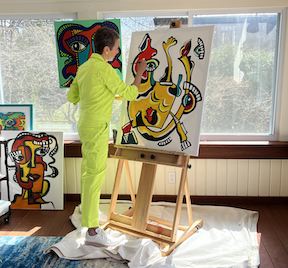

I love to tell people all about my skepticism regarding yoga before I finally tried it; as someone who is constantly on the go, the idea of sitting on a mat and being still sounded like torture to me. If there were "yoga people"-- you know, people who are naturally calm and slow and patient--then I was most definitely not a yoga person.
Except, now I am a yoga person, and it's because I don't come to those stereotypical attributes naturally that I've come to love it so much. Yoga forces me to stop and do the things I know will help make me happier, but that I sometimes find hard to do when I'm away from my mat. For me, looking at the science behind yoga made it feel a lot more real and a lot less "woo-woo," too. The benefits of practicing yoga have been known by yogis for thousands of years, but modern research proves that it truly can make you happier:
Different kinds of yoga have different benefits
My vision of yoga before I tried it was a lot of statue-like beautiful people in a bare studio going "Om" in unison. It turns out that there are lots of different types of yoga, from very spiritually-focused and/or relaxing all the way up to very athletic and physically demanding. If you think yoga isn't for you because you like (or dislike) a particular style of workout, do your research--chances are excellent there's a style and venue that you'll enjoy. Yoga has become so popular that it's everywhere, and there's no one single way to do it.
Yoga changes your brain immediately
You may think it takes years of dedicated practice before you start to see happiness-results, but that's not the case at all. Studies have shown that the brain's gamma-aminobutyric (GABA) levels spike after just a single hour of yoga. Higher GABA levels are associated with lower levels of depression and anxiety. Simply put, even a single class can start changing your brain chemistry and improving your mood.
Long-term yoga practice creates long-term changes
Those who stick with regular yoga practice report themselves to be happier and healthier. Studies like this one show that yoga reduces fatigue, anxiety, and anger. Real biochemical changes created through yoga practice support better physical and mental health.
Breathing makes you happier
Every yoga practice incorporates some elements of focusing on the breath to invigorate or relax. Research has shown that the ability to become aware of and regulate the breath is key in terms of lowering stress and anchoring oneself in the moment--both of which are needed to feel happier. Although you could do the breathing exercises without the yoga, pairing the two together is a guaranteed happiness-booster.
Straighten your mood
Did you know that your posture is related to your mood? It is, and although we tend to think of sadness as causing slumping rather than vice-versa, it turns out that changing your posture can change your mood. Yoga of all types strengthens that brain-body connection where the body sends messages to the brain that make it feel strong and positive, so don't wait to lengthen your spine and stand up straight!
Don't miss your happier boost!
Subscribe to our weekly email to get practical tips and inspiration to help you feel more joyful and resilient.


